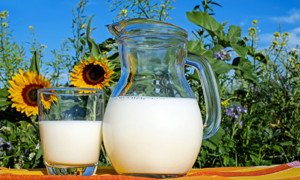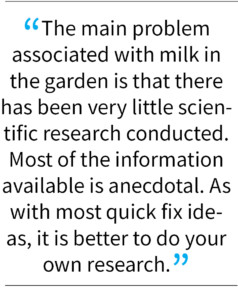Your Garden … with Kate Russell: Milk can be beneficial in Gilroy gardens, but only up to a point
Some researchers believe that aphids may be deterred by foliar sprays of milk

By Kate Russell

Kate Russell
Can milk be useful in your garden? Some gardeners say it can be used as a fungicide or fertilizer, while others praise milk’s ability to acidify the soil. As surprising as it may sound, milk may be useful in your Gilroy garden, up to a point.
Can milk be used as fertilizer?
Anything added to the compost pile or soil will ultimately be broken down. Milk contains amino acids, enzymes, fats, minerals, proteins, salts, sugars, and vitamins.
Many of those minerals are useful to plant health. Milk also contains nitrogen, but only a tiny amount. Milk can be used as a fertilizer, but the time you added enough milk to see results, your garden would smell like a rotten dairy.
Will milk acidify soil?
Milk has a pH of 6.6, which is ideal for plants. When it curdles, that pH shifts to 5.0, which is acidic. Milk will alter pH, but only temporarily. As expensive as milk is, there are far more affordable, effective methods, but it won’t hurt.
Can milk kill insects?
Forget the myth that claims insects die from milk exposure because they lack a pancreas. Sap-sucking insects process sugar every day.
Some researchers believe that aphids may be deterred by foliar sprays of milk.
The mechanism is not yet understood. It may be that aphids simply do not like the milk residue, or pathogens that grow on the milk are a threat to aphids. We don’t know.
Can milk cure disease?
 Foliar (leaf) sprays of milk on wheat, grape, squash, melon, and pumpkin leaves are said to prevent fungal and bacterial diseases.
Foliar (leaf) sprays of milk on wheat, grape, squash, melon, and pumpkin leaves are said to prevent fungal and bacterial diseases.
Generally speaking, milk or whey, applied before exposure to powdery mildew does reduce incidence of that disease. Milk does not control black spot.
Research has also shown that foliar sprays of milk are effective in treating viral diseases, particularly mosaic diseases on barley, beans, beets, celery, peas, spinach, sunflowers, tomatoes, and zucchini.
Again, we do not know how this works. Note that no studies succeeded using nonfat milk. In fact, dried skim milk has been shown to induce, rather than prevent, Alternaria leaf spot, black rot, and soft rot on cruciferous crops.
The main problem associated with milk in the garden is that there has been very little scientific research conducted. Most of the information available is anecdotal. As with most quick fix ideas, it is better to do your own research.
If you decide to use milk to prevent disease, it is recommended that whole milk be sprayed on soil prior to planting and again when insects appear or just prior to when powdery mildew and similar diseases are expected to occur.
You can also dump sour milk into your compost pile or around acid-loving plants, such as blueberries.
Can milk help improve your plant and soil health? Yes, and no. Just remember, rotten milk smells bad.
- Your Garden . . . with Kate Russell: Plant your garden according to watering needs, known as hydrozoning - August 12, 2021
- Your Garden . . . with Kate Russell: Trade in your lawn for a meadow and reduce maintenance chores - July 15, 2021
- Your Garden . . . with Kate Russell: The right soil chemistry balance will go a long way for healthy plants - June 17, 2021
